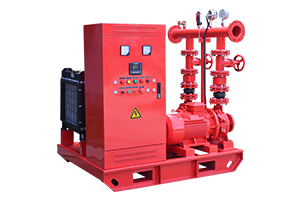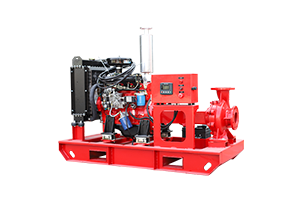What measures are taken to prevent corrosion in fire pump impellers, and how often should inspections be conducted?
Jan 16, 2024
Share:
To prevent corrosion in fire pump impellers, several measures can be taken:
1. **Material Selection:** Choosing corrosion-resistant materials for constructing impellers is crucial. Materials like stainless steel, bronze, or other corrosion-resistant alloys are commonly used.
2. **Protective Coatings:** Applying protective coatings, such as epoxy or other corrosion inhibitors, can help create a barrier between the impeller surface and corrosive elements in the water.
3. **Regular Inspection and Maintenance:** Conducting regular inspections is essential to identify any signs of corrosion early on. This allows for timely maintenance or replacement of the impeller if needed.
4. **Proper Pump Operation:** Ensuring proper pump operation and maintenance of optimal operating conditions can contribute to minimizing corrosion. This includes monitoring the pump's speed, fluid flow, and pressure.
5. **Water Quality Monitoring:** Monitoring and maintaining the quality of the water being pumped is important. Corrosion can be accelerated in the presence of impurities or corrosive substances in the water.
As for the frequency of inspections, it depends on various factors including the type of pump, operating conditions, and the environment. Generally, regular inspections should be conducted at least annually. However, more frequent inspections may be necessary in corrosive environments or if the pump is subjected to heavy usage.
It's important to refer to the specific guidelines provided by the pump manufacturer and any relevant industry standards for detailed recommendations on inspection and maintenance schedules.
.jpg)
1. **Material Selection:** Choosing corrosion-resistant materials for constructing impellers is crucial. Materials like stainless steel, bronze, or other corrosion-resistant alloys are commonly used.
2. **Protective Coatings:** Applying protective coatings, such as epoxy or other corrosion inhibitors, can help create a barrier between the impeller surface and corrosive elements in the water.
3. **Regular Inspection and Maintenance:** Conducting regular inspections is essential to identify any signs of corrosion early on. This allows for timely maintenance or replacement of the impeller if needed.
4. **Proper Pump Operation:** Ensuring proper pump operation and maintenance of optimal operating conditions can contribute to minimizing corrosion. This includes monitoring the pump's speed, fluid flow, and pressure.
5. **Water Quality Monitoring:** Monitoring and maintaining the quality of the water being pumped is important. Corrosion can be accelerated in the presence of impurities or corrosive substances in the water.
As for the frequency of inspections, it depends on various factors including the type of pump, operating conditions, and the environment. Generally, regular inspections should be conducted at least annually. However, more frequent inspections may be necessary in corrosive environments or if the pump is subjected to heavy usage.
It's important to refer to the specific guidelines provided by the pump manufacturer and any relevant industry standards for detailed recommendations on inspection and maintenance schedules.
.jpg)






